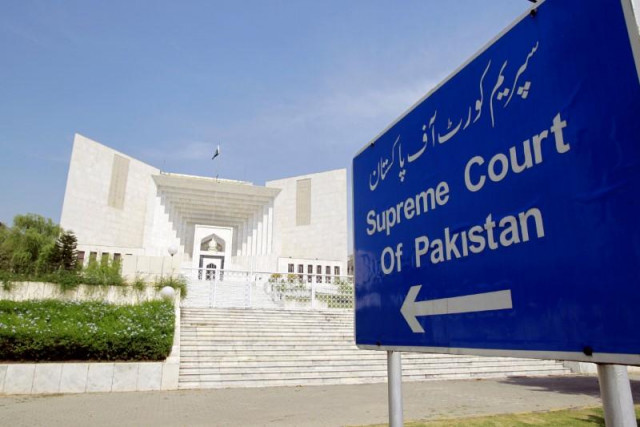Centre can set up hospitals in provinces: SC
Top court says I8th Amendment doesn’t curtail federal govt’s authority

PHOTO: REUTERS
The apex court made the observation in its detailed 46-page verdict regarding transferring the control of the Jinnah Postgraduate Medical Centre (JPMC), the National Institute of Cardiovascular Diseases (NICVD), the National Institute of Child Health (NICH), the National Museum of Pakistan (NMP) in Karachi and Sheikh Zayed Postgraduate Medical Institute (SZPMI) in Lahore from the federal government to the provinces.
In its short order issued in January this year, the Supreme Court had ruled that the ownership of the JPMC, NICVD and the NICH would remain with the federal government.
“The more one scrutinises the argument that the federal government cannot set up and run hospitals in any of the provinces, the more unsustainable and flawed it becomes,” read the detailed judgement authored by Justice Ijaz ul Ahsan.
“Surely, the intention behind the 18th Amendment could not have been to prevent the federal government from opening healthcare facilities in any of the provinces, for concluding so would be tantamount to attributing absurdity to a constitutional provision, something which we are not prepared to do bearing in mind the well-known canons of statutory and constitutional interpretation.”
Many doctors had challenged the devolution of these hospitals to the provinces after the 18th Constitutional Amendment.
Justice Maqbool Baqar differed with the majority verdict and has already issued a separate note. The legal opinion is divided about implications of the judgement on provincial autonomy.
Karachi-based lawyer Salahuddin Ahmed disagreed with the judgement. “It [verdict] basically says that federal government can act in any area where the question of fundamental rights of citizens is involved,” he noted.
“Since nearly all legislative and executive acts pertain to one or another of the fundamental rights, this practically means that the federation can act in any area and it practically nullifies the 18th Amendment.”
However, former additional attorney general Waqar Rana says that the judgement was a valuable addition to the country’s constitutional jurisprudence that would restore balance to the withering federation after the 18th Amendment.
"The Supreme Court being the ultimate interpreter of the constitution has played its role in creating a viable federation,” he maintained.
Justice Ahsan in the verdict noted that the transfer of the institutions was indeed carried out pursuant to the 18th Amendment. “However, we find that the transfer of the institutions from the federal to the provincial government was unconstitutional, in that the institutions did not fall within the Concurrent Legislative List as required by Clause (8) read with Clause (9) of Article 270AA of the Constitution, hence the Implementation Commission went beyond its constitutional mandate in this regard,” the verdict read.
“Consequently, any purported transfer/devolution of the institutions by the federal government and the subsequent notifications and orders issued pursuant thereto were unlawful and of no legal effect.”
Justice Ahsan also referred to Liaqat Hussain’s case wherein it was stated that federal government was not absolved from conferring the fundamental rights contained in the constitution upon its citizens and the state was required to enforce such rights.
"We find that this duty prevails, notwithstanding the respective domain of federal and provincial executive authority as determined by the respective federal and provincial legislative competence in light of the provisions of Articles 97, 137 and 142 of the Constitution (read in conjunction with the Federal Legislative List).”
The court noted that in the broader scheme of things, notwithstanding the fact that it has been held in the earlier portion of this opinion that the various institutions involved in this matter fell within the respective entries of the Federal Legislative List, these institutions drew constitutional and legal validity from a very significant and core feature of our democratic constitution, i.e. fundamental rights.
"With respect to the medical institutions in particular the JPMC, NICVD, NICH and SZPMI, the relevant fundamental right is the right to life enshrined in Article 9 of the Constitution which provides that ‘No person shall be deprived of life or liberty save in accordance with law’. As highlighted above in the case of the province of Sindh supra, this court held that the right to life is a positive right thereby entitling the holder of such right to provision of some good or service; and being a positive right, it placed a positive duty on the state to act. Therefore the court notes that the state, which undoubtedly includes the federal government as per Article 7 of the Constitution, is duty-bound and is under an obligation to guarantee the enforcement of the fundamental rights enshrined in the Constitution, with the most important one being the right to life."
The court observed that the right to life entailed the right to healthcare which meant that everyone had the right to the highest attainable standard of physical and mental health and this comprises of access to all kinds of medical services including but not limited to hospitals, clinics, medicines and services of medical practitioners which must not only be readily available and easily accessible to everyone without discrimination, but also of high standard.
“As the state, the federal government has an obligation to carry out all necessary steps to ensure realisation of this goal,” the verdict read.
Furthermore, the ruling also cited international law which emphasised the right to healthcare and imposed a duty on Pakistan, as a member state of various organisations including the UN and WHO and had ratified various international covenants including the Universal Declaration of Human Rights and the International Covenant on Economic, Social and Cultural Rights to ensure its enforcement.
“The words ‘research’, ‘professional’, ‘technical’, ‘training’, ‘promotion’ and ‘special studies’ must be construed liberally and given their widest possible meaning, therefore they can relate to any discipline or field as the noted Entry itself does not contain any restriction in this regard,” the court observed.
“It is an admitted fact that the JPMC was a federal agency/institute and therefore satisfies the first limb of Entry No 16 of the Federal Legislative List. As regards the second limb, while it may be difficult to pinpoint whether the research and/or training on the one hand or the hospital aspect on the other was predominant, the question ultimately boils down to whether the research and/or training taking place at JPMC was merely ancillary or incidental to the operation of the hospital. The answer to this question, in our opinion, is in the negative. The hospital and institute aspects of the JPMC are interdependent and mutually supporting. Bearing in mind the cardinal principle of interpretation that legislative lists ought to be construed liberally and be given the widest amplitude possible, we find that the JPMC did fall within Entry No 16 ibid.”
The court noted that there was another aspect of NICVD which required attention. “The provincial assembly of Sindh has passed the National Institute of Cardiovascular Diseases (Sindh Administration) Act, 2014 (NICVD Sindh Act) which is basically a replica of the NICVD Ordinance. The former appears to have been enacted to displace the latter. We find this act of the provincial assembly attempting in effect to overturn a federal law and nullify the same to be unconstitutional, particularly considering the fact that the NICVD fell within the domain of the federal government.”
The court also observed that the federal government, the provincial government and Jinnah Sindh Medical University (JSMU) should mutually agree on a workable methodology to retain and preserve the status of the varsity and safeguard the interests of its present and future students.
“In this regard, in case persons working in the JPMC and the NICH are required to perform services at the JSMU, the federal and provincial government shall discuss and agree upon mutual financial and fiscal adjustments so that the interests of all concerned parties are adequately and fairly safeguarded. The JSMU is required to file compliance reports within the last week of the six-month time period for perusal in chambers.”


















COMMENTS
Comments are moderated and generally will be posted if they are on-topic and not abusive.
For more information, please see our Comments FAQ